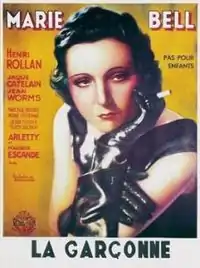La Garçonne (1936 film)
La Garçonne (The Bachelor Girl or The Flapper) is a 1936 French black-and-white film adaptation of the novel of the same name by Victor Margueritte. It was directed by Jean de Limur, and starred Marie Bell (in the title role), Arletty and Edith Piaf.
| La Garçonne | |
|---|---|
 Marie Bell in La Garçonne (1936) | |
| Directed by | Jean de Limur |
| Written by | Albert Dieudonné (scriptwriter) |
| Based on | La Garçonne by Victor Margueritte |
| Starring | Marie Bell |
| Music by | Jean Wiener (including the music for Quand même, sung by Édith Piaf, lyrics by Louis Poterat) |
| Cinematography | Roger Hubert Charlie Bauer |
| Edited by | Jean Oser |
| Distributed by | Franco London Films |
Release date |
|
Running time | 95 minutes |
| Country | France |
| Language | French |
Plot
The eponymous garçonne or flapper is Monique Lerbier, an emancipated French woman who leaves home to escape a marriage of convenience to a man she does not love which her parents have forced on her. She then falls into all sorts of carnal temptations and artificial pleasures previously unknown to her. These include her being seduced into a lesbian love affair by a chanteuse character (played by Edith Piaf), ensuring the film became a succès de scandale. Another actress in the film, Arletty, said of it:
It was advanced, as an idea. Victor Margueritte, the author of the novel, took a major part in the production process. I maintained Marie Bell, in the film. One of the last times we saw each other, shortly before her death, we recalled this memory. "I maintained you in La Garçonne", I said to her, "and luckily this was not real life, otherwise you would have cost me dearly!" It has to be said of Marie that she was not cheap to keep! And how we laughed! [...] The film was a success thanks to the scandal it provoked. Seeing "bonnes femmes" as flappers, smoking opium [...] Seeing female homosexuals, in that epoque!" [1]
Cast
- Marie Bell : Monique Lerbier
- Arletty : Niquette
- Henri Rollan : Régis Boisselot
- Maurice Escande : Lucien Vigneret
- Jaque Catelain : Georges Blanchet
- Pierre Etchepare : Plombino
- Philippe Hersent : Peer Rys
- Jean Worms : Monsieur Lerbier
- Marcelle Praince : Madame Lerbier
- Vanda Gréville : Élisabeth
- Suzy Solidor : Anika
- Édith Piaf : the chanteuse
- Jean Tissier : Monsieur des Souzaies
- Marcelle Géniat : Aunt Sylvestre
- Junie Astor
- Jane Marken
Crew
- Director : Jean de Limur
- Writers: Albert Dieudonné after the novel of the same name by Victor Margueritte (Éditions Flammarion, 1922)
- Adaptation : Marion Fort
- Dialogue : Jacques Natanson
- Music : Jean Wiener
- Song : Quand même, sung by Édith Piaf, lyrics by Louis Poterat, music by Jean Wiener[2][3]
- Cinematography: Roger Hubert, Charlie Bauer
- Sound engineers : Robert Tesseire
- Design : Lucien Aguettand
- Editing : Jean Oser
Production details
- Production company : Franco London Films (
 France)
France) - Principal photography : Began in December 1935
- Format : Black-and-white — Monophonic sound — 35 mm
References
- Extract from Arletty ou la liberté d’être, biography by Christian Gilles, Librairie Séguier, Paris, 1988, ISBN 2-906284-86-6.
- Video of the song on YouTube
- The lyrics give some idea of the film's atmosphere:
- Mes sens inapaisés,
- Cherchant pour se griser,
- L'aventure des nuits louches,
- Apportez-moi du nouveau.
- Le désir crispe ma bouche.
- La volupté brûle ma peau…
External links
- La Garçonne at IMDb
